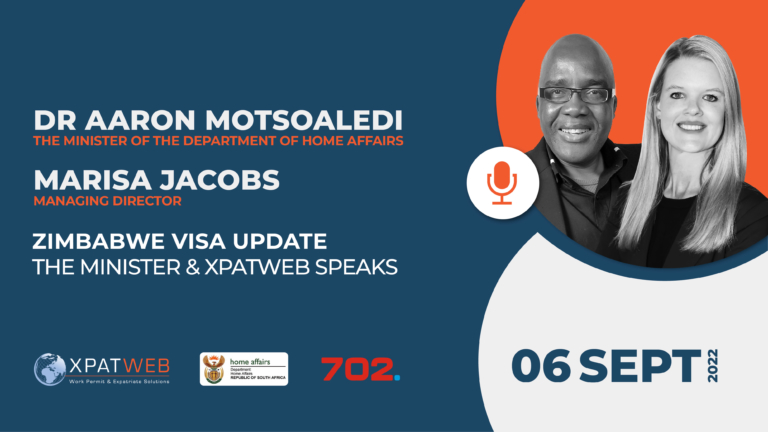SA Visas May Give ZEP Holders The Best Chance Of Staying In SA
/in Archived, News /by xp-adminThis is according to Marisa Jacobs, Managing Director at Xpatweb, an expatriate and international mobility services firm. “The general but mistaken sentiment among ZEP holders seems to be that it is a pointless exercise because applicants will inevitably not be successful with their applications,” she says.
The reality is that ZEP holders can benefit much more from taking action now than waiting for their permits to expire.
In October, Zimbabwe’s Minister of Information, Publicity and Broadcasting Services, Monica Mutsvangwa, said that less than 10% of the some 180,000 ZEP holders had applied for available South African visas. This was against the previous deadline of 31 December 2022. Because of the low response, the Minister of Home Affairs extended the period of exemption to 30 June 2023.
Protection
It appears evident that the government wants to end the ZEP process itself rather than discourage the presence of Zimbabweans in South Africa. This is so that, as foreign nationals, their stay in the country will be administered through the prescribed visa system and not independently of it.
“The Minister’s published directive on the implementation of the extension expresses sensitivity to the applicants by providing them with concrete protection,” says Jacobs.
This includes the following provisions for ZEP holders during the extension period:
- They may not be arrested, ordered to depart the country, detained for deportation, or deported for not having a valid exemption certificate label or sticker in their passport.
- They may not be dealt with in terms of sections 29 (Prohibited persons), 30 (Undesirable persons) and 32 (Illegal foreigners) of the Immigration Act.
- They may exit and re-enter the country freely provided they meet all the requirements for entry/departure, except for having a valid permit in their passport.
- They are not required to produce a valid exemption certificate or an authorisation letter to remain in South Africa when making their application for any category of visa, including a temporary residence visa.
“This means they can move around freely and apply for an appropriate visa without fear of exposing themselves to prosecution or bureaucratic discrimination,” says Jacobs.
Benefits of a visa
A ZEP holder only has to look at the limiting conditions reflected in their passport to realise the benefits of applying for a visa.
First, they do not have the right to seek permanent residence in South Africa, regardless of how long they remain in the country. Applying for a visa for which they qualify presents the possibility of one day enjoying permanent residence.
ZEPs also cannot be renewed or extended. The current extension applies to the elimination of the ZEP system altogether, not the expiry of individual permits. On the other hand, visas may be renewed for qualifying candidates.
In addition, the ZEP holder cannot change the conditions of their permit inside South Africa. For example, to be granted a work visa, they would need to return to Zimbabwe and make their application through an SA embassy there. The extension grants them the ability to apply for a visa while still in the country.
Act now
Of course, the deciding factor is that the ZEP holder’s time will run out on 30 June 2023 anyway. So, they have nothing to lose by making their application but nothing to gain if they don’t. Home Affairs has made it clear that no further extensions will be granted.
Finally, it is possible that a backlog will build up nearer the deadline, causing delays in the processing of applications.
“To ensure that your status remains valid post 30 June 2023, apply now to give yourself the best chance of success and plenty of time to plan ahead,” says Jacobs.






